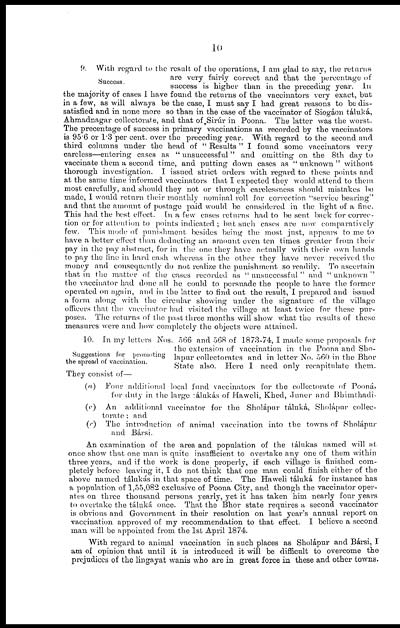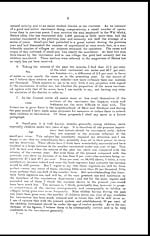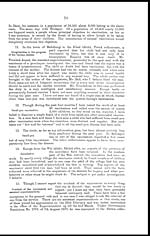Medicine - Vaccination > 1856-1876 - Report on vaccination throughout the Bombay Presidency and Sind > Vaccination in Bombay 1874-1876 > 1873-1874 - Report on vaccination throughout the Bombay Presidency and Sind for the year 1873-74
(66) Page 10
Download files
Individual page:
Thumbnail gallery: Grid view | List view

10
Success.
9. With regard to the result of the operations, I am glad to say, the returns
are very fairly correct and that the percentage of
success is higher than in the preceding year. In
the majority of cases I have found the returns of the vaccinators very exact, but
in a few, as will always be the case, I must say I had great reasons to be dis-
satisfied and in none more so than in the case of the vaccinator of Siogáon táluká,
Ahmadnagar collectorate, and that of Sirúr in Poona. The latter was the worst.
The precentage of success in primary vaccinations as recorded by the vaccinators
is 95.6 or 1.3 per cent. over the preceding year. With regard to the second and
third columns under the head of " Results " I found some vaccinators very
careless—entering cases as " unsuccessful " and omitting on the 8th day to
vaccinate them a second time, and putting down cases as " unknown " without
thorough investigation. I issued strict orders with regard to these points and
at the same time informed vaccinators that I expected they would attend to them
most carefully, and should they not or through carelessness should mistakes be
made, I would return their monthly nominal roll for correction "service bearing"
and that the amount of postage paid would be considered in the light of a fine.
This had the best effect. In a few cases returns had to be sent back for correc-
tion or for attention to points indicated ; but such cases are now comparatively
few. This mode of punishment besides being the most just, appears to me to
have a better effect than deducting an amount even ten times greater from their
pay in the pay abstract, for in the one they have actually with their own hands
to pay the fine in hard cash whereas in the other they have never received the
money and consequently do not realize the punishment so readily. To ascertain
that in the matter of the cases recorded as " unsuccessful " and " unknown "
the vaccinator had done all the could to persuade the people to have the former
operated on again, and in the latter to find out the result, I prepared and issued
a form along with the circular showing under the signature of the village
officers that the vaccinator had visited the village at least twice for these pur-
poses. The returns of the past three months will show what the results of these
measures were and how completely the objects were attained.
Suggestions for promoting
the spread of vaccination.
10. In my letters Nos. 566 and 568 of 1873-74, I made some proposals for
the extension of vaccination in the Poona and Sho-
lapur collectorates and in letter No. 560 in the Bhor
State also. Here I need only recapitulate them.
They consist of—
(a) Four additional local fund vaccinators for the collectorate of Pooná,
for duty in the large tálukás of Haweli, Khed, Juner and Bhimthadi-
(c) An additional vaccinator for the Sholápur táluká, Sholápur collec-
torate ; and
(c) The introduction of animal vaccination into the towns of Sholápur
and Bársi.
An examination of the area and population of the tálukas named will at
once show that one man is quite insufficient to overtake any one of them within
three years, and if the work is done properly, if each village is finished com-
pletely before leaving it, I do not think that one man could finish either of the
above named tálukás in that space of time. The Haweli táluká for instance has
a population of 1,55,082 exclusive of Poona City, and though the vaccinator oper-
ates on three thousand persons yearly, yet it has taken him nearly four years
to overtake the táluká once. That the Bhor state requires a second vaccinator
is obvious and Government in their resolution on last year's annual report on
vaccination approved of my recommendation to that effect. I believe a second
man will be appointed from the 1st April 1874.
With regard to animal vaccination in such places as Sholápur and Bársi, I
am of opinion that until it is introduced it will be difficult to overcome the
prejudices of the lingayat wanis who are in great force in these and other towns.
Set display mode to: Large image | Zoom image | Transcription
Images and transcriptions on this page, including medium image downloads, may be used under the Creative Commons Attribution 4.0 International Licence unless otherwise stated. ![]()
| Permanent URL | https://digital.nls.uk/91027913 |
|---|
| Attribution and copyright: |
|
|---|---|




